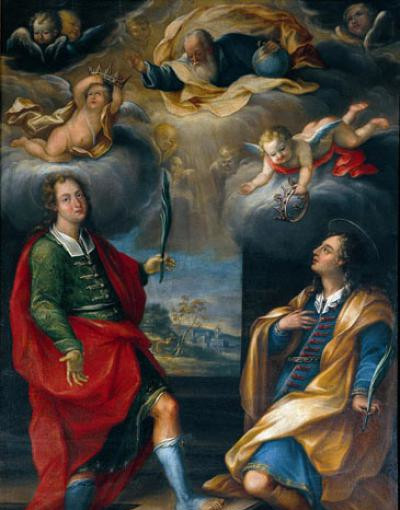
Saint of the Day for 26 September: Saints Cosmas and Damian
The story of the twin brothers who healed the sick
Name
Saints Cosmas and Damian
Title
Martyrs
Recurrence
26 September
Martyrology
2004 edition
Prayer
O glorious Medici Saints, who made the healing art an instrument of unspeakable charity and a means of sublime apostolate, and confirmed with blood your faith in Jesus Christ, we confidently turn to your powerful intercession. Obtain for us from the Lord firm and industrious faith, fervent charity, health of mind and body, zeal for the glory of God and the good of our brothers. Obtain for us, after a sincerely Christian life, a holy death, which will unite us with You and all the Blessed in the eternal vision of God. So be it.
Patron saints of
Concorezzo, Borgaro Torinese, Alberobello, Saints Cosma and Damiano, Cellino San Marco, Valbrembo, Persico Dosimo, Airuno, Altino, Carbonara di Nola
Protector of
Surgeons, dentists, pharmacists, hairdressers
Roman Martyrology
Saints Cosmas and Damian, martyrs, who are believed to have practised as doctors in Cirro in the province of Euphratesia, in present-day Turkey, without asking for any remuneration, and to have healed many with their gratuitous care.
The Saint and Mission
The life and work of Saints Cosmas and Damian are intertwined in a mission that goes beyond the mere practice of medicine. Their story exemplifies a mission deeply rooted in serving humanity and defending the Christian faith. Some of the significant dimensions of their mission are analysed below:
Medicine as a Humanitarian Mission
Cosmas and Damian are known for practising medicine without charging their patients, embodying the Christian principle of serving others. Their medical practice was not just a profession, but a humanitarian mission to alleviate suffering and promote healing.
Testimony of Faith
Their steadfast adherence to the Christian faith, even in the face of persecution and death, shows a greater mission to bear witness to the resilience of faith. Through their actions, they demonstrated the possibility of living a righteous life despite challenges and persecution.
Education and Moral Example
Cosmas and Damian became examples of moral integrity and compassion, educating the community on the virtues of mercy, generosity and selflessness. Their lives are a tangible lesson on how personal mission can be aligned with Christian values to create a positive impact.
Legacy of Benevolence
Their legacy lives on as a testimony of benevolence and selfless service. As patron saints of doctors, their mission continues to inspire the medical community and beyond, reminding us of the importance of putting the needs of others before our own.
Spiritual and Physical Healing
They were not only focused on physical healing, but also on spiritual healing. Their mission was deeply spiritual, seeking to bring comfort and hope to the desperate and suffering, showing that the Christian mission goes beyond physical wellbeing, reaching out to the spiritual heart of humanity.
Community and Brotherhood
Through their close fraternal cooperation, they demonstrated the importance of community and solidarity in the realisation of a common mission. Their unity amplified the impact of their mission, emphasising the power of collaboration in serving a greater good.
Saints Cosmas and Damian embody the integration of profession, faith and altruistic mission, offering an enduring example of how dedication to the service of others can create a transformative impact in society. Their journey exemplifies a profound and multifaceted mission that continues to resonate through the centuries, inspiring countless individuals to pursue a path of selfless service and love.
The Saint and Mercy
Saints Cosmas and Damian, known as Christian doctors and martyrs, embodied the essence of mercy through their selfless medical practice and their loyalty to Christianity despite persecution. Here is an analysis of their life and mission in relation to mercy:
Altruistic Service
Cosmas and Damian were known for their dedication to providing medical care without asking for compensation. This act of selfless service is a tangible expression of mercy, demonstrating a deep commitment to alleviating human suffering without seeking personal gain.
Mercy and Empathy
Their ability to empathise with the sick and needy, providing care and comfort, reflects a merciful heart. Mercy was not just limited to a physical act, but permeated their empathetic and compassionate approach to those who suffered.
Unwavering Faith
Even in the face of persecution and death, Saints Cosmas and Damian remained steadfast in their Christian faith. Their mercy extended even to their persecutors, praying for their conversion and forgiving their deeds.
Fraternal Bond
Their strong fraternal bond also symbolises a form of mercy. They supported each other through the challenges of life and their medical mission. Fraternity is an aspect of mercy, which manifests itself in accompanying each other in adversity.
Legacy of Mercy
The legacy of Saints Cosmas and Damian continues to be a testimony of mercy. They are venerated as patron saints of doctors, celebrating the nobility of the medical profession when practised with mercy and selflessness.
Spiritual Teaching
The life and work of Saints Cosmas and Damian are a powerful reminder of the importance of mercy in serving others, a teaching that resonates throughout the centuries and continues to inspire not only the medical community, but all those who are called to serve others with love and compassion.
Saints Cosmas and Damian embody divine mercy through their medical practice, fraternity and fidelity to the faith, reminding us that mercy is a fundamental virtue that guides human actions towards unconditional love and selfless service.
Hagiography
The martyr saints Cosmas and Damian were twin brothers, according to the Roman Martyrology, and companions not only in blood, but also in faith and martyrdom. They studied medicine together in Syria and soon rose to great fame for their skill in curing the sick. They may have been Arabs by birth, but very much by …
